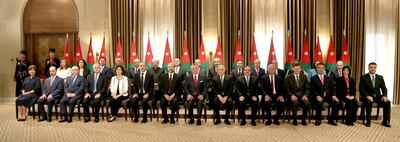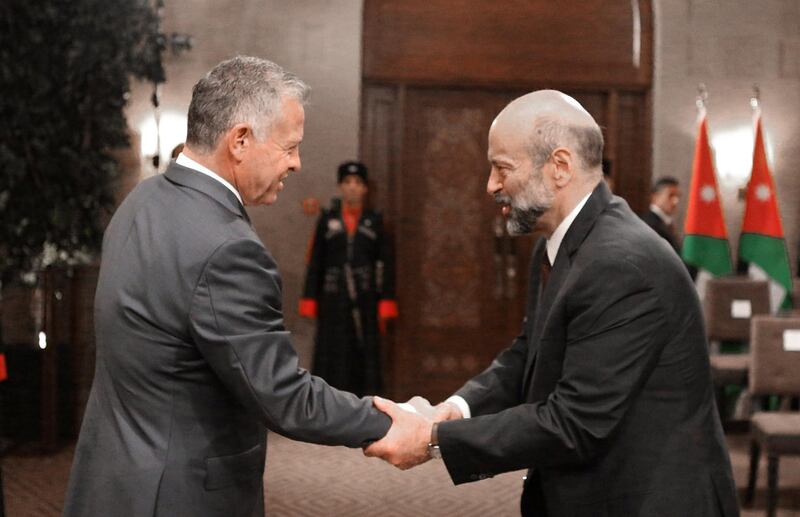King Abdullah swore in Jordan’s new government in on Thursday headed by former World Bank economist Omar Razzaz who will now attempt to tackle tax reforms while trying to avoid similar nationwide protests that brought down his predecessor.
Sixteen members of the 28-minister government retained their positions but the new administration includes seven women, the largest female political representation in the country’s history. The new administration is largely made up of technocrats which most being conservative and a small number of liberal-leaning ministers.

Rajai Muasher, a banker and prominent businessman, was appointed as deputy prime minister and minister of state for a second time after serving in 2010. He previously served as a senator.
Muasher is an advocate for the private sector taking a more dominant role in the economy dominated by a bloated public sector and many observers see him as being against the income tax proposals that triggered protests leading Hani Al-Mulki to resign on June 4.
Vocal critic of the government’s economic policies and editor in chief of Jordan’s independent Al Ghad newspaper, Jumana Ghneimat, was appointed spokesperson with the tough job of getting the public on board with Mr Razzaz’s yet to be announced reforms.
______________
Read more:
UAE, Saudi Arabia and Kuwait agree aid package of $2.5bn for Jordan
Editorial: Arab nations must provide a unified front for regional stability
Jordan on edge: New PM tasked with delicate balancing act
______________
Mr Razzaz’s appointment was welcomed due to his reformist image and impressive credentials but experts have said the wider cabinet line-up was lacklustre, dampening hopes of real change.
“The new government is a reincarnation of the previous government, it will face a tough job selling itself to the public and gaining their trust,” said Jawad Anani, an economist and a former deputy prime minister. “I am not expecting much change.
"Even the new faces who are seen as liberals will always be outnumbered. They need time to learn the rules of the game. The new government could have been [formed] in one day," he told The National.
“More than half of his ministerial team kept their posts and this is disappointing,” said Imad Hmoud, an independent business analyst. “We will hardly see any changes concerning the government’s economic policies and Mr Muasher will face a tough job balancing people’s concerns about further austerity measures and the IMF demands.”
Mr Abdullah swore in the cabinet based on the recommendation of the prime minister. Mr Razzaz announced his picks last week after consultation with parliament as well as past and present officials.
Mr Razzaz’s first order of business after being tipped for the post was to announce his intention to withdraw the controversial tax bill proposed by Mr Al-Milki in a bid to ease tensions after a week-long protest and the first general strike in decades.
Jordan's economy has been hit hard by regional crises, border closures that disrupted export routes, interruptions of gas supplies from Egypt and an influx of Syrian refugees.
Unemployment is above 18 per cent, the highest in years, while poverty stands at 14.4 per cent.
The IMF predicts the country's growth will increase slightly from 2.3 per cent in 2017 to 2.5 per cent this year. The upward curve is expected to reach 2.9 per cent next year.
While Mr Razzaz is inheriting a ballooning public debt just a little under 100 per cent of GDP and little appetite from ordinary Jordanians to shoulder more of the fiscal burden, the countries Gulf allies recently rallied around.
Mr Abdullah attended a meet in Makkah with leaders from Saudi Arabia, UAE and Kuwait who pledged a $2.5 billion aid package. Other Gulf states have promised assistance including funding and assigned quotas for Jordanian workers in their countries.
Mazen Irshied, an independent economic analyst, said most importantly for the new government would be to end economic policies heavily reliance on tax collection and grants.
"The government cannot continue relying on foreign aid, something which it has been doing in the past six decades," he said. "We want the new government to adopt policies that will generate economic growth and bring foreign investments particularly in the fields of energy and renewable energy instead of relying on importing 97 per cent of its energy needs."
Mohammad Qasem, a political activist who took part in protests, said the new cabinet lacked a cohesive vision. But, he said, "we have to be realistic and not expect this government will have a magic wand."





